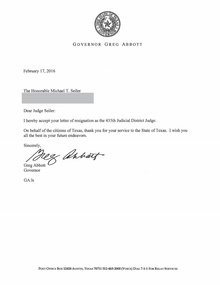Contempt of court, often referred to simply as "contempt", is the crime of being disobedient to or disrespectful toward a court of law and its officers in the form of behavior that opposes or defies the authority, justice, and dignity of the court. A similar attitude toward a legislative body is termed contempt of Parliament or contempt of Congress. The verb for "to commit contempt" is contemn and a person guilty of this is a contemnor or contemner.
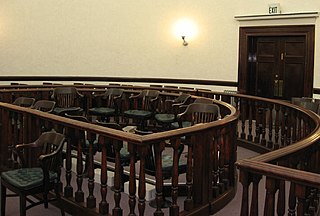
A jury is a sworn body of people (jurors) convened to hear evidence, make findings of fact, and render an impartial verdict officially submitted to them by a court, or to set a penalty or judgment.

Criminal justice is the delivery of justice to those who have been accused of committing crimes. The criminal justice system is a series of government agencies and institutions. Goals include the rehabilitation of offenders, preventing other crimes, and moral support for victims. The primary institutions of the criminal justice system are the police, prosecution and defense lawyers, the courts and the prisons system.
A bench trial is a trial by judge, as opposed to a trial by jury. The term applies most appropriately to any administrative hearing in relation to a summary offense to distinguish the type of trial. Many legal systems use bench trials for most or all cases or for certain types of cases.

A courtroom is the enclosed space in which courts of law are held in front of a judge. A number of courtrooms, which may also be known as "courts", may be housed in a courthouse. In recent years, courtrooms have been equipped with audiovisual technology to permit everyone present to clearly hear testimony and see exhibits.

In England and Wales, a magistrates' court is a lower court which hears matters relating to summary offences and some triable either-way matters. Some civil law issues are also decided here, notably family proceedings. In 2010, there were 320 magistrates' courts in England and Wales; by 2020, a decade later, 164 of those had closed. The jurisdiction of magistrates' courts and rules governing them are set out in the Magistrates' Courts Act 1980.

In law, a trial is a coming together of parties to a dispute, to present information in a tribunal, a formal setting with the authority to adjudicate claims or disputes. One form of tribunal is a court. The tribunal, which may occur before a judge, jury, or other designated trier of fact, aims to achieve a resolution to their dispute.
Mental health courts link offenders who would ordinarily be prison-bound to long-term community-based treatment. They rely on mental health assessments, individualized treatment plans, and ongoing judicial monitoring to address both the mental health needs of offenders and public safety concerns of communities. Like other problem-solving courts such as drug courts, domestic violence courts, and community courts, mental health courts seek to address the underlying problems that contribute to criminal behavior.
Larry Seidlin is an American judge.

The court of assizes is the trial court which tries the most serious crimes in the judicial system of Belgium. It is the highest Belgian court with criminal jurisdiction; as such, it is the only Belgian court that can sentence someone to life imprisonment. The courts of assizes are not permanent courts; a new court of assizes is assembled for each new trial. There is a court of assizes in each of the ten provinces of Belgium, as well as one in the arrondissement of Brussels-Capital which is not part of any province. Further below, an overview is provided of the eleven courts of assizes and their seats. They are the only courts in Belgium for which the provinces are used as territorial subdivisions. They are also the only courts in Belgium that hold jury trials. The jury acts as sole trier of fact, but decides on the penalty together with the judges. The trial by jury of certain crimes is laid down in article 150 of the Belgian Constitution. The Belgian courts of assizes have the same origin as their French namesakes.

The State Courts of Singapore is one of the three categories of courts in Singapore, the other categories being the Supreme Court and Family Justice Courts. The State Courts comprise the District and Magistrate Courts—both of which oversee civil and criminal matters—as well as specialised courts such as the coroner's courts and the Small Claims Tribunals.
Mark Everett Fuller is a former United States district judge of the United States District Court for the Middle District of Alabama. Fuller is most recognizable for presiding over the controversial case of former Alabama Governor Don Siegelman. On August 1, 2015, he resigned following a federal court investigation into allegations about spousal abuse.
The term county judge is applied as a descriptor, sometimes as a title, for a person who presides over a county court. In most cases, such as in Northern Ireland and the Victorian County Courts, a county judge is a judicial officer with civil or criminal jurisdiction. In the United States, however, there are some "County Courts" which exercise primarily administrative functions, in which case the County Judge may exercise largely or solely executive authority and be equivalent to the county executive in other local government areas.
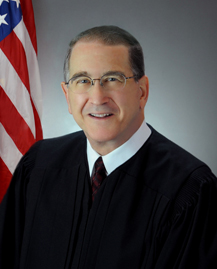
David Hittner is a senior United States District Judge on the United States District Court for the Southern District of Texas. He also has served by temporary assignment on the U.S. Court of Appeals for the 5th Circuit, as well as the U.S. District Courts for the Southern District of New York and the District of Arizona. His tenure as a federal jurist began in 1986, when he was nominated for the lifetime position by President Ronald Reagan and unanimously confirmed by the U.S. Senate. Prior to his appointment to the federal bench in 1986, Hittner served from 1978 to 1986 as the elected judge of the 133rd Judicial District Court of Harris County, Texas, based in Houston.

The Superior Court of Los Angeles County is the California Superior Court located in Los Angeles County. It is the largest single unified trial court in the United States.
A court show is a broadcast programming subgenre comprising legal dramas and reality legal programming. Court shows present content mainly in the form of legal hearings between plaintiffs and defendants presided over in one of two formats: scripted/improvised with an actor portraying a judge; or an arbitration-based reality format with the case handled by an adjudicator who was formerly a judge or attorney.
Kevin Paul Zervos is a Justice of Appeal of the Court of Appeal of Hong Kong. He previously served as Director of Public Prosecutions of the Department of Justice of the Hong Kong Special Administrative Region from March 2011 to September 2013.
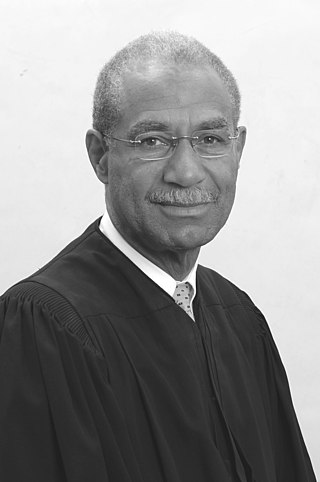
Gershwin Allen Drain is a senior United States district judge of the United States District Court for the Eastern District of Michigan.
Nicole Nadra Baukus is an American woman convicted of two counts of vehicular manslaughter stemming from a fatal car collision on June 29, 2012, in which she was driving intoxicated. Baukus pleaded guilty to the charges and was sentenced to 38 years in prison with the possibility of parole. Highway surveillance cameras showed Baukus' vehicle traveling on the wrong side of Interstate 45 after she had consumed alcohol at a nearby bar. A later request for a new trial was denied. Baukus attended and graduated from Oak Ridge High School in Conroe, Texas.
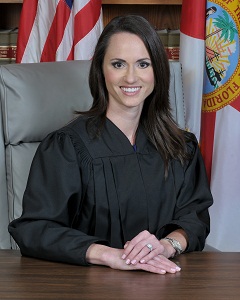
Elizabeth Anne Scherer is an American lawyer who served as a judge in the Seventeenth Judicial Circuit Court of Florida from 2012 until her resignation in 2023.

